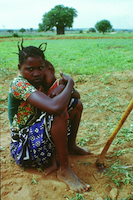Sexual and Gender-Based Violence
The Sexual and Gender-Based Violence (SGBV) theme focuses on the incidence and prevalence of violence against women in conflict and post-conflict settings. Polarisation of gender roles, proliferation of weapons, militarisation, and the breakdown of law influence SGBV.
The risk of SGBV is heightened during conflict by aggravating factors, including the polarization of gender roles, the proliferation of arms, the militarization of society, and the breakdown of law and order. The subsequent long-term and complex impacts of SGBV continue to affect individuals and communities after conflict ends.
SGBV is addressed in all five resolutions on Women, Peace and Security. In SCR 1888, the Security Council expresses its intention to ensure peacekeeping mandate resolutions contain provisions on the prevention of, and response to, sexual violence, with corresponding reporting requirements to the Council (OP11). The resolutions deal with protecting women from violence (1820,OP3, 8-10; 1888,OP3,12); strengthening local and national institutions to assist victims of sexual violence (1820,OP13; 1888,OP13); and including strategies to address sexual violence in post-conflict peacebuilding processes (1820,OP11). SCR 1820 also calls for the participation of women in the development of mechanisms intended to protect women from violence (OP10).
Lastly, SCR 1960 creates institutional tools and teeth to combat impunity and outlines specific steps needed for both the prevention of and protection from conflict-related sexual violence. The new “naming and shaming,” listing mechanism mandated in the Resolution is a step forward in bringing justice for victims and a recognition that sexual violence is a serious violation of human rights and international law.
Addressing SGBV is an integral aspect of the overall Women, Peace and Security agenda. SGBV affects the health and safety of women, and also has significant impact on economic and social stability. The Security Council recognises that sexual violence can threaten international peace and security, and that it is frequently used as a tactic of war to dominate, humiliate, terrorise, and displace.
For more resources on this Critical Issue, visit PeaceWomen Resource Center >>

 walking the streets..."
walking the streets..."